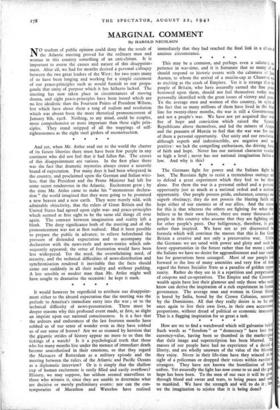And yet, when Mr. Attlee read out to the world
the charter of its future liberties there must have been few people in any continent who did not feel that it had fallen flat. The causes of this disappointment are various. In the first place there was the fact that dramatic mysteries always create a neurotic brand of expectation. For many days it had been whispered in the country, and proclaimed upon the German and Italian wire- less, that the President and the Prime Ministei had left for some secret rendezvous in the Atlantic. Excitement grew ; by the time Mr. Attlee came to make his " momentous declara- tion " the world imagined that they were going to be promised a new heaven and a new earth. They were merely told, with admirable objectivity, that the rulers of Great Britain and the United States had agreed upon eight war- and peace-principles which seemed at first sight to be the same old things all over again. The contrast between imagination and reality left a blank. The deep significance both of the meeting and of the pronouncement was not at first realised. Had it been possible to prepare the public in advance, to relieve beforehand the pressure of distended expectation and to accompany the declaration with the news-reels and news-stories which sub- sequently appeared, the sense of frustration would have been less widespread. Yet the need, the overwhelming need, of security, and the technical difficulties of news-distribution and synchronisation rendered it inevitable that the facts should come out suddenly in all their nudity and without padding. A less sensible or modest man than Mr. Attlee might well have sought to dramatise the occasion: he kept it stark.


























 Previous page
Previous page